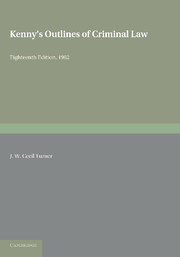Book contents
- Frontmatter
- Preface to the Sixteenth Edition
- Preface to The Seventeenth Edition
- Preface to the Eighteenth Edition
- Contents
- Index of cases
- Index to the principal statutes
- List of principal books cited
- BOOK I GENERAL CONSIDERATIONS
- BOOK II DEFINITIONS OF PARTICULAR CRIMES
- BOOK III MODES OF JUDICIAL PROOF
- CHAPTER XXVI THE NATURE OF PRESUMPTIONS AND OF EVIDENCE
- CHAPTER XXVII THE GENERAL RULES OF EVIDENCE
- CHAPTER XXVIII RULES OF EVIDENCE PECULIAR TO CRIMINAL LAW
- BOOK IV CRIMINAL PROCEDURE
- Appendix I The meaning of ‘credit’
- Appendix II II Rules as to admission of evidence which reveals to the jury facts discreditable to the person accused
- Appendix III III Forms of indictment
- Index
CHAPTER XXVI - THE NATURE OF PRESUMPTIONS AND OF EVIDENCE
from BOOK III - MODES OF JUDICIAL PROOF
Published online by Cambridge University Press: 05 June 2016
- Frontmatter
- Preface to the Sixteenth Edition
- Preface to The Seventeenth Edition
- Preface to the Eighteenth Edition
- Contents
- Index of cases
- Index to the principal statutes
- List of principal books cited
- BOOK I GENERAL CONSIDERATIONS
- BOOK II DEFINITIONS OF PARTICULAR CRIMES
- BOOK III MODES OF JUDICIAL PROOF
- CHAPTER XXVI THE NATURE OF PRESUMPTIONS AND OF EVIDENCE
- CHAPTER XXVII THE GENERAL RULES OF EVIDENCE
- CHAPTER XXVIII RULES OF EVIDENCE PECULIAR TO CRIMINAL LAW
- BOOK IV CRIMINAL PROCEDURE
- Appendix I The meaning of ‘credit’
- Appendix II II Rules as to admission of evidence which reveals to the jury facts discreditable to the person accused
- Appendix III III Forms of indictment
- Index
Summary
Section I. Strictness of English Rules of Evidence
A ready knowledge of the law of evidence is essential to all who are engaged in forensic practice. The occasions for its use arise suddenly; and the rules must be applied forthwith, before the witness has had time to break them.
The restrictions imposed by the English rules of evidence appear in marked contrast to the laxity of proof allowed in some foreign tribunals. But the constitutional value of our stringency is great. For it has done much towards producing that general confidence in our criminal courts which has kept popular feeling in full sympathy with the administration of the criminal law, and has thereby facilitated the task of government to an extent surprising to some foreign observers.
The student may be assisted in marshalling in his mind the somewhat complicated details of this branch of law if he realizes at the outset that, at any rate so far as the administration of justice in the criminal courts is concerned, the fabric of our evidential system has been gradually built up to give effect to three main ethical axioms. The first is that any person who makes a positive assertion of fact in legal proceedings should be compelled to establish the truth of his allegations to the satisfaction of the tribunal before which he makes them; this is what is known as the burden of proof, or onus probandi The second is that in endeavouring to discharge the burden of proof no one may be allowed to bring in matters which are not logically relevant to the fact or the facts in issue; there are two fundamental reasons for this principle, (i) lest untrained minds might thereby be led to a false conclusion, and (ii) lest the time of the court should be wasted. The third is that an accused person must be treated fairly and equitably1 at all stages of the proceedings.
A SAFEGUARD AGAINST MISTAKES BY THE JURY
Bearing the above axioms in mind it will be seen that many of our rules of evidence were created in consequence of a peculiarity of English procedure in taking away from the trained judges the determination of questions of fact, and entrusting it to untrained laymen.
- Type
- Chapter
- Information
- Kenny's Outlines of Criminal Law , pp. 439 - 456Publisher: Cambridge University PressPrint publication year: 2013



